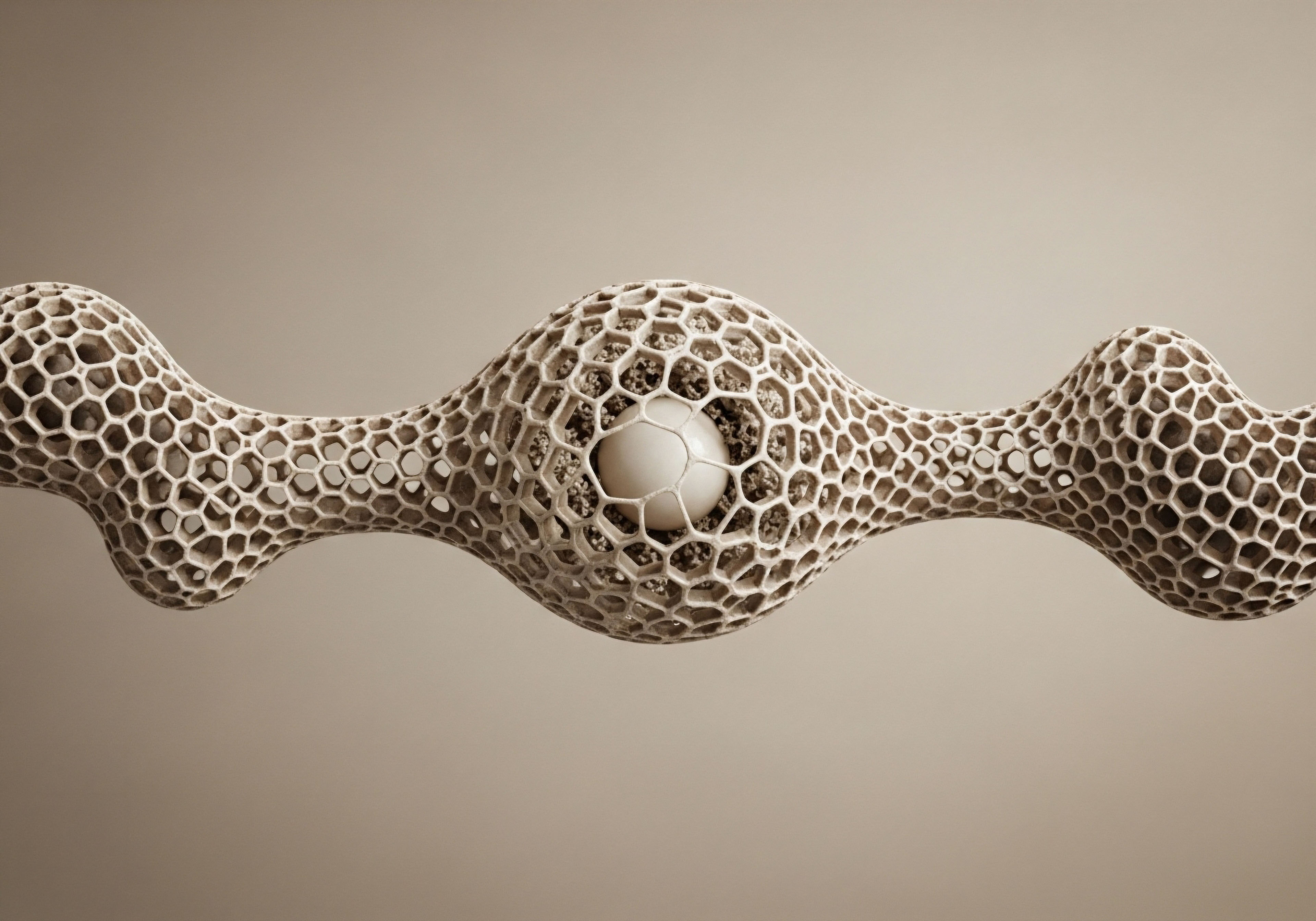

The Body’s Unwritten Operating System
Human biology operates on a complex, often unseen, series of directives. Within this intricate network, cellular performance dictates our capacity for strength, recovery, mental acuity, and enduring vitality. We experience subtle shifts in energy, cognitive function, and physical resilience. These shifts frequently signal an underlying desynchronization within the body’s internal systems, a deviation from its optimal code. Our pursuit involves identifying these deviations and re-establishing peak function.

Decoding Cellular Imperatives
Aging presents a progressive challenge to cellular efficiency. The body’s intrinsic ability to repair, regenerate, and maintain homeostasis diminishes over time. This decline manifests as reduced hormonal output, impaired metabolic function, and compromised immune responses. A proactive stance moves beyond merely managing symptoms. It centers on understanding the fundamental cellular mechanisms that govern our health trajectory. We seek to intervene at the source, addressing the core programming that orchestrates biological output.
The conventional view of health often focuses on disease management. A more advanced perspective considers health a state of optimized performance, a dynamic equilibrium where every cellular process contributes to a robust, high-functioning system. This perspective views the body as a sophisticated machine, capable of significant upgrades and fine-tuning. The goal extends beyond merely avoiding illness; it encompasses the active cultivation of superior physical and cognitive states.
Cellular senescence, a hallmark of aging, correlates with a 30-40% reduction in tissue regenerative capacity by middle age, underscoring the necessity of targeted interventions for maintaining physiological resilience.

Reclaiming Biological Momentum
Peptide therapy represents a sophisticated method for recalibrating these fundamental biological processes. Peptides are short chains of amino acids, signaling molecules that direct cellular activity. They act as precise messengers, communicating specific instructions to cells, influencing everything from hormone secretion to tissue repair and metabolic regulation. Understanding these signals allows us to restore cellular communication pathways that have become inefficient or dormant.
This approach stands apart from broad-spectrum interventions. Peptides offer targeted influence, akin to delivering specific software updates to the body’s operating system. They do not force a response. Instead, they encourage the body to restore its inherent capabilities, promoting a more balanced and efficient internal environment. The objective remains clear ∞ to unlock the full spectrum of an individual’s biological potential, moving beyond the accepted limitations of chronological age.


Precision Signaling for Biological Upgrade
Peptides operate through highly specific receptor binding, initiating cascades of intracellular events. Their actions are often modulatory, influencing existing physiological pathways rather than introducing foreign substances. This nuanced interaction enables precise control over various biological functions, offering a sophisticated toolkit for enhancing cellular performance. The selection of specific peptides depends on the desired outcome, whether it involves augmenting growth hormone release, accelerating tissue repair, or modulating immune function.

Architecting Cellular Directives
Consider the growth hormone-releasing peptides (GHRPs) and growth hormone-releasing hormone (GHRH) analogs. These peptides stimulate the pituitary gland to produce and secrete growth hormone naturally. This process avoids the exogenous administration of growth hormone, allowing the body to maintain its delicate feedback loops. Increased growth hormone levels support lean muscle mass, reduce adipose tissue, enhance bone density, and improve skin elasticity.
Other peptides specialize in tissue regeneration and injury recovery. BPC-157, for instance, exhibits remarkable regenerative properties across various tissues, including muscle, tendon, ligament, and gut. It promotes angiogenesis and modulates inflammatory responses, accelerating healing processes. TB-500, a synthetic version of Thymosin Beta-4, similarly aids in wound repair and reduces inflammation. These agents offer a significant advantage for athletes and individuals seeking rapid recovery from physical stress or injury.
The application of peptide therapy involves a deep understanding of these mechanisms:
- Targeted Receptor Activation ∞ Peptides bind to specific receptors on cell surfaces, initiating precise biochemical responses.
- Modulation of Endogenous Pathways ∞ They work with the body’s natural systems, enhancing or rebalancing existing functions.
- Cellular Communication Enhancement ∞ Peptides restore efficient signaling between cells, improving overall systemic coordination.
- Stimulation of Regenerative Processes ∞ Many peptides promote tissue repair, cell proliferation, and angiogenesis.
Clinical studies on BPC-157 demonstrate a significant acceleration in tendon-to-bone healing, with improvements observed in tensile strength and histological parameters, showcasing its potent regenerative capacity.

Strategic Application Principles
Effective peptide therapy demands a meticulous approach. This involves a comprehensive assessment of an individual’s physiological state, including biomarker analysis and a detailed understanding of their performance goals. The protocols are tailored, considering factors such as peptide half-life, optimal dosing, and administration routes. This precise methodology ensures maximal efficacy and safety, aligning the intervention with the body’s natural rhythms.
A strategic application might involve a combination of peptides to achieve synergistic effects. For example, combining a GHRH analog with a GHRP can create a more robust pulsatile release of growth hormone. The objective remains consistent ∞ to provide the body with the specific instructions it requires to perform at its zenith, translating advanced science into tangible, measurable improvements in health and performance.


Protocols for Enduring Human Flourishing
Integrating peptide therapy into a performance optimization regimen requires strategic timing and a long-term vision. The ‘when’ extends beyond a simple start date. It encompasses the cyclical nature of biological adaptation, the phases of intervention, and the sustained maintenance of gains. This intelligent application positions peptide therapy as a cornerstone of a proactive, longevity-focused lifestyle.

Optimizing Biological Rhythms
The initial phase often involves a foundational protocol, designed to address systemic deficiencies and establish a baseline of improved cellular function. This period typically spans several weeks to months, allowing the body to respond and adapt to the new signaling environment. Regular monitoring of biomarkers provides objective data on the therapy’s impact, guiding subsequent adjustments. The goal centers on observable improvements in energy, sleep quality, recovery, and body composition.
Following this foundational period, the strategy evolves. Maintenance protocols may involve lower dosages or intermittent cycles, designed to sustain the benefits without overstimulating the body. This adaptive approach acknowledges the dynamic nature of human physiology, ensuring that interventions remain aligned with evolving needs. The focus shifts from acute restoration to long-term preservation and enhancement of cellular performance.

Longevity’s Next Chapter
The decision to initiate peptide therapy often arises from a desire to transcend conventional aging trajectories. Individuals seeking to maintain peak physical and cognitive function well into their later years find this approach compelling. It appeals to those who recognize the body’s immense capacity for self-repair and regeneration, provided it receives the correct biological directives. This proactive stance contrasts sharply with passive acceptance of age-related decline.
Consider individuals facing ∞
- Declining energy levels and persistent fatigue.
- Impaired recovery from exercise or injury.
- Suboptimal body composition, including stubborn fat and muscle loss.
- Reduced cognitive clarity and focus.
- A general sense of diminished vitality that impacts daily performance.
These experiences signal a biological opportunity. Peptide therapy offers a precise method to re-engage the body’s innate healing and optimizing capabilities. It is a commitment to an elevated standard of living, where biological potential dictates the boundaries of experience.

Mastering the Future of Self
The landscape of human optimization is rapidly evolving, moving beyond generalized health advice to embrace precision biology. Peptide therapy stands as a testament to this progression, offering a sophisticated method for direct cellular engagement. It provides a unique opportunity to author a more resilient, high-performing biological narrative.
This is an era where individuals actively participate in shaping their physiological destiny, leveraging advanced science to define their peak. We move forward with the understanding that the future of human potential is not a fixed outcome, but a code waiting to be fully activated. This pursuit embodies a commitment to an unparalleled existence, driven by scientific precision and an unwavering demand for excellence.



